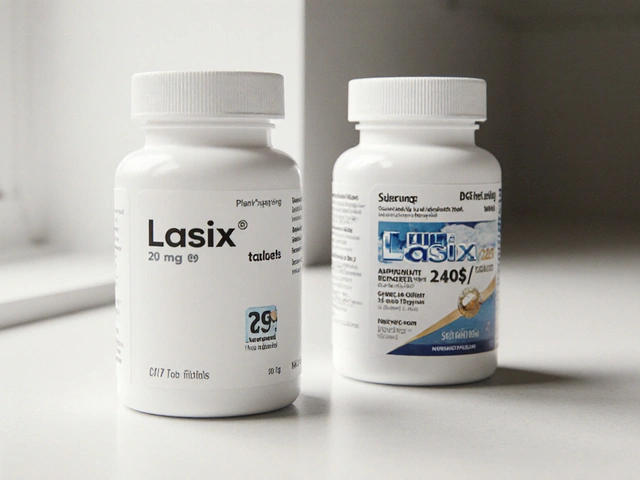May 2025 Archive — Practical Pharma Guides & Health Tips
Four clear, useful posts went live this month. If you want straightforward advice about a common heart drug, hair loss tied to medicines, low phosphate and bone health, or a Nordic herb that’s getting attention, you’ll find practical steps below.
Toprol (metoprolol): what to know and do
Toprol is a beta blocker used for high blood pressure, some heart conditions, and even migraine prevention. The article explains typical dosages, common side effects like fatigue or slow pulse, and simple rules: take it the same time each day, don’t stop suddenly, and check blood pressure and heart rate at home. Watch for dizziness, breathlessness, or sudden weight gain — call your clinician if those appear. Also check interactions: certain antidepressants and heart rhythm drugs can change how Toprol works.
Practical tip: if you miss a dose, take it when you remember unless it's almost time for the next one. Carry a list of all meds and ask your provider about dose changes before surgery or if you get sick.
Hair loss from medicine: targeted treatments that work
Drug-induced alopecia needs a different approach than typical pattern hair loss. The May article covers dermatologist-backed options: topical minoxidil to speed regrowth, PRP (platelet-rich plasma) for stubborn thinning, and realistic timelines—hair often starts to recover months after stopping the trigger drug. If you can’t stop the medication, combining minoxidil with scalp care and nutrient checks (iron, vitamin D) helps.
Actionable steps: talk to your prescriber about alternatives if a drug seems to cause hair loss. Ask a dermatologist about starting minoxidil early and about PRP only after a professional assessment.
Hypophosphatemia and bone health
Low phosphate is more than a lab number — it can weaken bones and cause fatigue or muscle problems. The post explains common causes (poor diet, some medications, alcohol use, or kidney issues) and clear prevention: eat phosphate-rich foods like dairy, fish, and beans, and follow up with blood tests if you have risk factors. If levels are low, treating the cause and using supplements under medical guidance fixes most cases.
Quick check: if you have unexplained bone pain or recurring fractures, ask your doctor about phosphate levels.
Iceland moss: what it actually does
Iceland moss is an old Nordic remedy with polysaccharides and antioxidants that may soothe coughs and support mild immune responses. The article looks at modern studies and safe ways to use it: teas, syrups, or standardized supplements. It’s not a cure-all — don’t use it instead of prescribed medicines, and check for allergies or interactions.
Where to go next
Each piece on GenericVilla.com gives concrete next steps: what to watch for, when to call a clinician, and how to ask the right questions. Read the full posts if you need dosing details, treatment timelines, or evidence references. And if you’re changing a medication or starting a supplement, bring the article points to your next appointment so decisions are clear and safe.
Toprol, also known as metoprolol, is a common beta blocker prescribed for high blood pressure, heart issues, and even migraines. This article dives deep into how Toprol works, its benefits, possible side effects, and practical tips for living well while taking it. By understanding this medication better, patients and families can feel more confident managing health challenges. If you're starting Toprol or want to know if it's right for you, get honest answers—minus the confusing medical talk.
View DetailsThis article breaks down top dermatologist-backed solutions for people experiencing drug-induced alopecia, particularly those on DMARDs. From tried-and-true minoxidil to the latest PRP therapies, see what science and patient stories say is genuinely effective. You'll discover tips, treatment strategies, and emerging research that goes far beyond the typical advice. Bonus: a close look at how drugs like sulfasalazine may kickstart hair loss and how to fight back. Forget generic hair loss tips—this is tailored for folks dealing with medication-triggered thinning.
View DetailsHypophosphatemia, or low phosphate levels, can mess with your bones in surprising ways. This article unpacks how phosphate keeps bones strong, what puts you at risk for deficiency, and what real steps you can take to dodge trouble. Practical prevention strategies and expert-backed facts shed light on staying healthy. Understand how food, lifestyle, and smart choices make all the difference. Read on for a complete, easy-to-follow guide on hypophosphatemia and your bones.
View DetailsIceland moss is getting serious attention for its unique blend of immune-boosting polysaccharides and antioxidants. Traditionally used across the Nordic countries as a remedy for coughs and chest discomfort, this lichen now has modern research to back up the old wisdom. Dive deep into what makes Iceland moss tick, how the Vikings used it, and whether those natural compounds truly keep colds and infections at bay. Learn practical ways to use Iceland moss at home and get tips on choosing the best supplements. Discover why this ancient remedy deserves a spot in your wellness routine.
View Details




